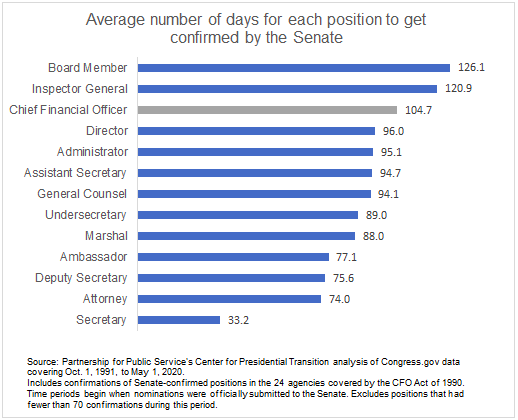Chief financial officers play an essential role in the stewardship of the federal government’s resources, guiding agency finances, strengthening the capability of the workforce, meeting customer needs and using new technologies to improve payment accuracy. As we approach the 30-year anniversary of the Chief Financial Officers Act of 1990, there have been continual improvements of financial management systems and audits, and greater use of technology and data to increase the government’s ability to make informed decisions.
While CFOs have played an essential part in these developments, challenges remain. The role of the CFO has not been updated since the 1990 legislation. Many agencies are still working to implement core elements of the statute, and several agencies remain out of compliance with the law’s technical requirements.

Another challenge has been the low priority given to CFOs by the Senate. One indication is the amount of time the Senate takes to confirm CFO appointees. For the nearly three-decades since the CFO law was enacted, the Senate has taken an average of 104.7 days to confirm CFOs. That is the third-longest average for any type of job within these agencies behind only inspectors general and members of various government boards.
A recent report produced by the Partnership for Public Service and Deloitte, “Finance of the Future,” made recommendations to modernize the role of CFO. One recommendation called for standardizing the position government-wide by delineating a common set of core responsibilities. This would enhance their ability to integrate and share information across agencies, transfer institutional knowledge and standardize functions.
Another recommendation called for improved continuity in CFO leadership. Currently, 15 of 24 federal CFOs are Senate-confirmed positions while the others are career positions. Congress should consider converting all CFO jobs to career positions or establishing the role as a fixed term with a performance contract. In that situation, CFOs would be expected to remain in office even with a change in administration.
Many of these recommendations are contained in a bipartisan bill proposed by Sens. Mike Enzi, R-Wyo. and Mark Warner, D-Va.
To meet the evolving needs of federal financial management, the Senate and agencies should make changes to better position CFOs to fulfill their obligations to the American people.